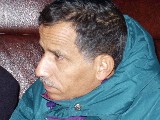|
afrol News, 5 November - 25 years in Moroccan prisons. 14 years on death row. One week in Norway. Which is the longest? Sidi Mohamed Daddach, awarded this year's Rafto human rights prize, finds no answer to this question. Grand Café, Oslo. A quick interview before the ex-political prisoner is to meet with the Norwegian parliament's Committee of Foreign Affairs; then PM Kjell Magne Bondevik. How do you speak about ill-treatment in Moroccan prisons in circumstances like this? Mr Daddach has become the symbol of Western Sahara's liberation struggle during some short days of the northern autumn. After almost an entire life in slow motion, the last days have been full of impressions: His first trip abroad, prestigious receptions and, most of all, the first encounter with his mother for 27 long years. In some hours, it will all be over. This afternoon, he will fly back to Western Sahara and contemplate what he has been through during the last week. At this moment, it is difficult to trace any feeling in his controlled face. - On death row one smiles during the day, Mr Daddach explains the essence of those 14 years during which he expected to be executed any day. "During the day, you understand that you have survived just another day. In the evening, the smile disappears. That is the time for executions and you never know if you are next in line." Mr Daddach was detained in the beginning of 1976, only 19 years old and with severe injuries. He was a member of the Sahrawi liberation movement Polisario, which is prohibited in Morocco. After attempting to escape, he was sentenced to death in 1980 and was placed in a solitary confinement cell in Rabat's high security prison for months. - I was in the cell without seeing the sun. It was prohibited to see the sun for those on death row. After several months, however, they let me out to see the sun for some short moments. The worst, however, was the fear, he says, the fear of not knowing whether he'd live to see the next day. He had to learn to get used to the loneliness. The family lived in refugee camps in Algeria. The prison was in Rabat, northern Morocco, and the friends were in Sahara. There was little common ground with the Moroccan prisoners. "With time, I've become fond of being lonely," he adds, surprisingly. And Mr Daddach did not let into the psychic ill-treatment, the lack of contact with the outside world, the lack of food and the constant pain from the untreated injuries he sustained as he was detained. On the contrary. He got involved in the fight for better prison conditions for the other political detainees, organised protest, went on hunger strike and smuggled secret reports about their situation out of prison. This is how he was nominated to the Rafto Award.
Exactly one year ago, Mr Daddach finally was released from prison, mostly due to the continuous pressure from human rights organisations from all over the world. The then 44-year-old man in a poor health condition travels back to Western Sahara, still occupied by Morocco. - Don't you recognise me? I'm Ibrahim, Mohamed, Fatima, and whatever they were named. I saw grown-up people which I last had seen as they still were babies. I came back in the same way a dead person comes back to life. The year of liberty in Layoune was dominated by reunification with family members and friends. It was mostly joy. But there was also political work. The Daddach residence quickly turns into a centre for Sahrawi human rights activists. The attention around the man who was forced to learn to enjoy loneliness increases even more as the Rafto Foundation from the distant Norwegian city of Bergen announces it will hand this year's human rights award to Mr Daddach. - The joy I have experienced this week is totally different from that in Sahara, Mr Daddach begins his description of his short visit to Norway. "I obtained a [Moroccan] passport, something I had not believed could happen. Only on 28 October, I was given a phone call and told they had issued it." The Norwegian Foreign Office and the Embassy in Rabat had been instrumental in achieving a passport for him. According to Amnesty International, Moroccan political dissidents cannot expect such services. - Then, there was the news that I was going to Norway, my first journey to Europe. Now, at this old age! Yes, I feel that I have grown old and now I really notice that I lost a big part of my life in prison. Here, he has received the Rafto Award, been received by the Lord Mayor of Bergen, Kristian Helland, politicians, lawyers, activists, journalists, etc, etc. "And they all smiled, all the time," he comments, astonished. But the real big issue was meeting his mother again after 27 years of separation. "You can imagine the joy I felt when they confirmed to me she would come - just one hour before she actually came!"
Mother, Enguia Bakay Lahbib, lives in the Dakhla refugee camp in the Algerian desert. Last week, she was asked whether she wanted to come to Norway to see her son. The 89-year-old had no doubts; this could very well have been her last chance. On Thursday, Ms Lahbib received an Algerian passport. On Friday, she had a Norwegian visa. On Saturday, she obtained a ticket that was going to airlift her Tindouf - Alger - Lyon - Amsterdam - Bergen on her first-ever travel. Saturday evening, she arrived on Bergen airport, received by her son and the press corps as the Queen of Sahara. Tears were flowing. - Mother said this had been like a miracle for her and that she felt that her life now had returned complete. Addressing the situation of more than hundred thousand Sahrawi refugees in Algeria that have been separated from family members for a quarter of a century, he agrees with his mother: "More Sahrawi mothers should be given a chance to experience this." It is no secret that meeting his mother was the greatest event during Mr Daddach's short stay in Norway. According to the official program, he was to meet with the Foreign Office and the Nobel Prize Committee yesterday. This was cancelled. Mother and son needed just one, small extra day in total privacy. The feelings all these impressions during the last, intensive week must have provoked remain confuse and distant. He is here, but he is absent. Mother just flew back to the refugee camp and maybe this was the last time they saw each other. The reactions will surface when he arrives Layoune this evening. But, what then, was longest? The 25 years in prison, the year in liberty or the week in Norway? "There has happened so very much this week," Mr Daddach says. We can not arrive at any conclusion, only that time becomes a terribly relative matter when you have lived a life such as the one of this 45-year-old Sahrawi. Text and
photos:
|
front page
| news
| countries
| archive
| currencies
| news alerts login
| about afrol News
| contact
| advertise
| español
©
afrol News.
Reproducing or buying afrol News' articles.
You can contact us at mail@afrol.com



